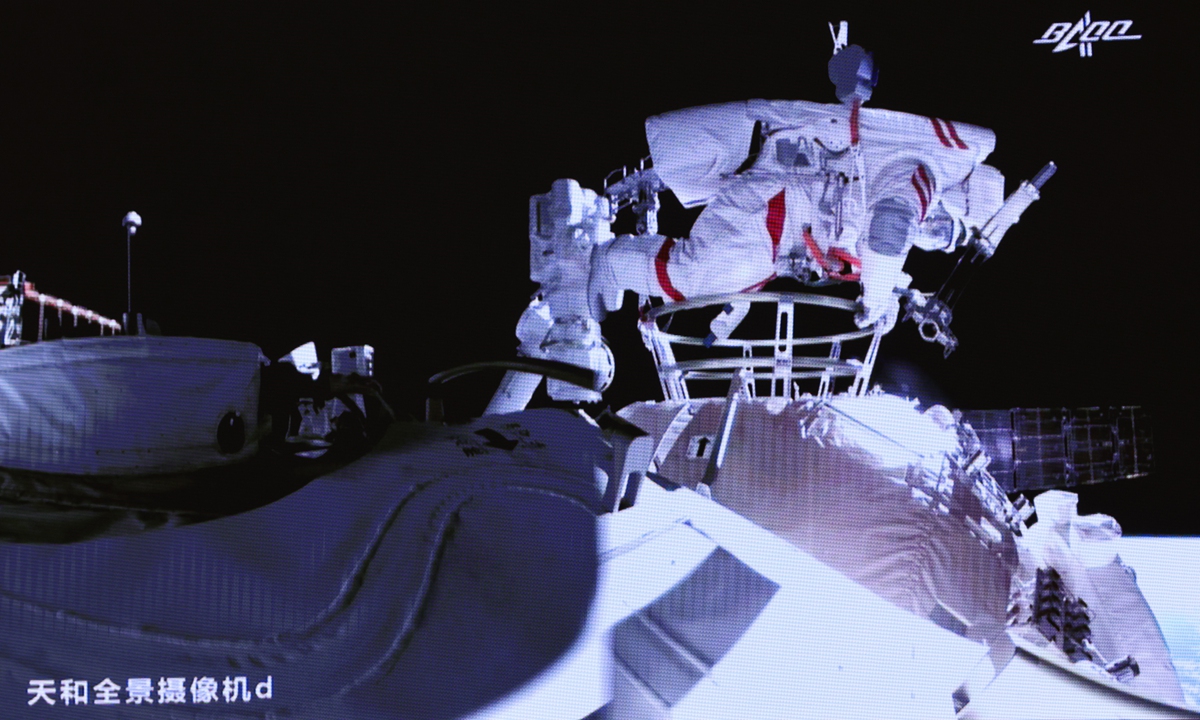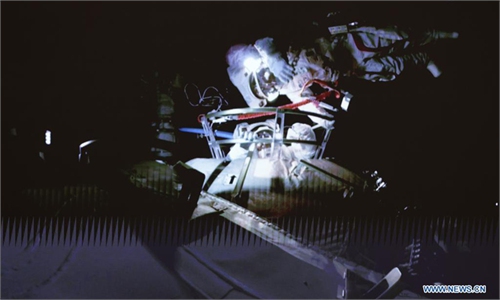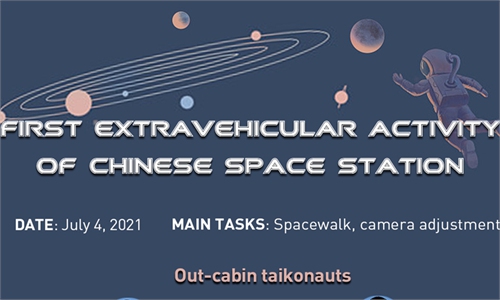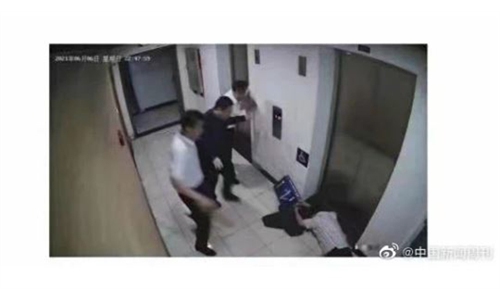
Screen image taken at Beijing Aerospace Control Center on Sunday shows one of the Chinese taikonauts conducting extravehicular activities (EVAs) out of the space station core module Tianhe. Photo: Xinhua
As taikonauts' health is one of the most important issues in China's manned aerospace program, a variety of methods, including traditional Chinese medicine (TCM) treatments and a space gym, are being used in the Tianhe space station's core cabin to ensure these taikonauts can complete the task safely and in good health.
A TCM-related machine was installed in the Tianhe core cabin for the first time, which can collect patterns and information of taikonauts' tongues, facial color and pulse, to monitor their health status.
The equipment can use TCM methods for diagnosis, and the data collected at the space station can be conveyed to Earth for TCM doctors to analyze the astronauts' physical conditions, Li Nanzhi, assistant to the chief commander of the astronaut system at the China Manned Space Agency, told China Central Television (CCTV).
CCTV's report said that as taikonauts need to live in the space station for a long time, and because of problems such as the weightless environment, radiation and diet, they can easily have health troubles. The TCM machine can help find these problems in time and ensure their health.
The TCM machine's operating principle is to use a camera to obtain images and information about human tongues and faces, and then compare the data with standards in the database, according to medical information website daosh.com.
The use of TCM in space has sparked a large number of discussions among Chinese netizens. The hashtag "TCM machine moved into space" had been viewed more than 80 million times on Sina Weibo as of Monday.
Cui Yongqiang, a chief physician at the Guang'anmen Hospital affiliated with the Chinese Academy of Chinese Medical Sciences in Beijing, told the Global Times on Monday that TCM is another good method to ensure taikonauts' health, combined with Western medicine.
"Taikonauts' digestive systems might be affected by the gravity-free condition, and they might lose their appetite or be disturbed by constipation, which can be found by observing whether their tongues turn yellow, according to TCM experience," Cui said as an example.
He added that some TCM materials such as Chinese angelica have been proved to be helpful in stabilizing the crew's physical conditions.
Another health monitoring facility sent with the taikonauts - the physiological signal test kit - will keep track of such real-time key indicators as ECG, respiration and body temperature. The kit will upload the data to an analysis research center that is capable of 1,000 hours of continuous recording, the Global Times learned from China Aerospace Science and Industry Corp (CASIC).
The Tianhe "villa," a name that was used by netizens because of its three separate deluxe bedrooms, a broad living room and a bathroom, also has a space gym equipped with a specially designed treadmill and a bicycle to support taikonauts' daily need for physical exercise.
In CCTV footage released on Sunday, Nie Haisheng, one of the three crew members onboard the Tianhe space station core cabin, was seen stepping onto the treadmill for a 15-minute running exercise.
Unlike those on the ground, the treadmill has a gravity simulation device to apply a certain amount of pressure so that the taikonaut will be held by the equipment.
The simulated gravitational environment helps develop the taikonauts' skeletal muscles, space analysts said.
Netizens also had their eyes on the space bicycle. In the CCTV footage, Tang Hongbo, the "newcomer in space" and the youngest of the crew at the age of 46, pedaled energetically on the bike while wearing a respirator used to strengthen the taikonauts' cardiopulmonary functions.
It is quite amusing and reassuring to see the taikonauts playing with various sports equipment such as resistance bands and pull-up facilities in space, netizens commented, "as if they are in an ordinary gym on the ground, indicating that they have adapted well to space life and seem to be enjoying it."
Neuromuscular stimulators have also been brought into space for muscle strengthening training that could help the taikonauts relieve muscle fatigue and prevent muscle atrophy caused by long-term flights, CASIC told the Global Times.
Yin Rui, deputy chief commander of the astronaut system at the China Manned Space Agency, said that taikonauts must conduct physical exercise at least two hours a day to maintain their physiological functions.




